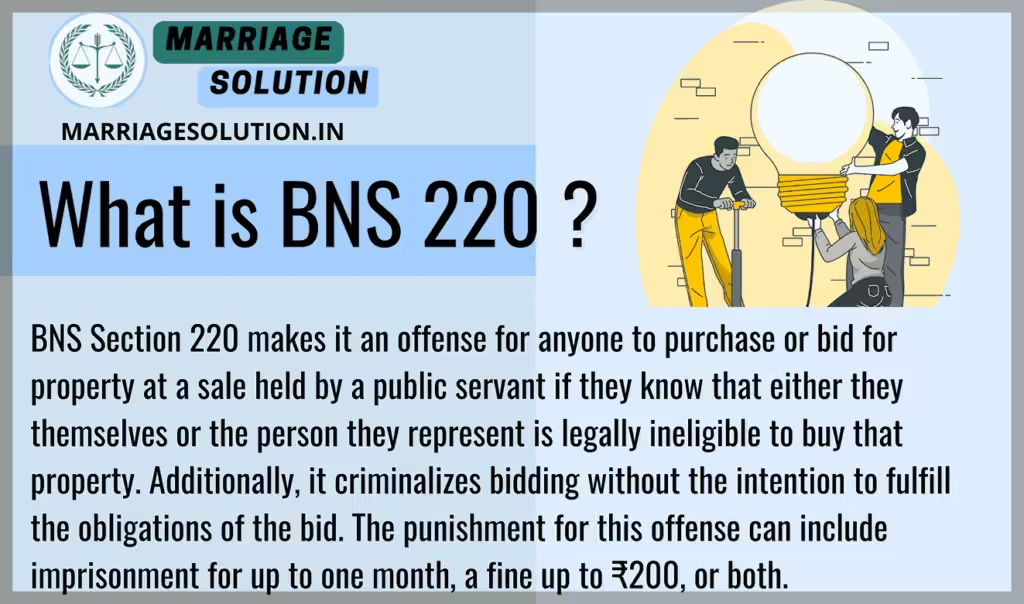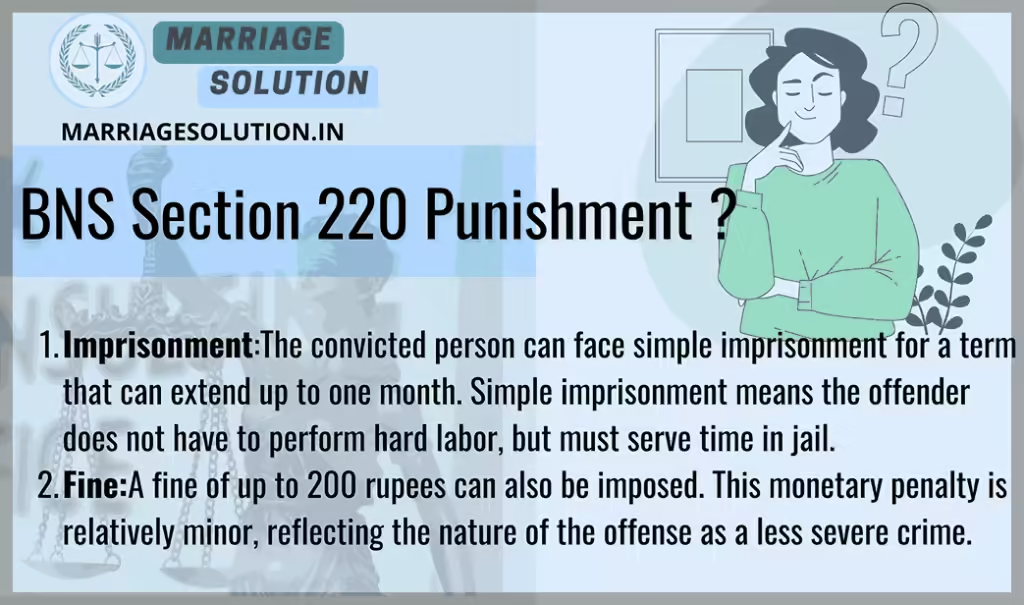Introduction of 220 BNS
BNS Section 220 is about illegal bidding or purchasing during public sales held by a public servant. If a person knowingly buys or bids for property despite being legally barred, or places a bid without intending to pay, they commit an offence under this section. The law ensures that all sales conducted by government authorities are fair, transparent, and not disrupted by dishonest bidders.
The Bharatiya Nyaya Sanhita (BNS) Section 220 replaces the old Indian Penal Code (IPC) Section 184.
What is BNS Section 220 ?
BNS Section 220 makes it an offense for anyone to purchase or bid for property at a sale held by a public servant if they know that either they themselves or the person they represent is legally ineligible to buy that property. Additionally, it criminalizes bidding without the intention to fulfill the obligations of the bid. The punishment for this offense can include imprisonment for up to one month, a fine up to ₹200, or both.

Under Section 220 of the bns act 2023
Whoever, at any sale of property lawfully made by authority of a public servant, purchases or bids for such property, either on his own behalf or on behalf of another person whom he knows to be legally disqualified from purchasing that property, or bids without intending to perform the obligations of such bid, shall be punished with simple imprisonment which may extend to one month, or with fine which may extend to two hundred rupees, or with both.”
1. Meaning of “Illegal Purchase or Bid”
- If a sale is being held by a public servant (like a court officer, revenue officer, or government auctioneer), everyone participating must follow the law.
- A person commits an offence if:
- They buy/bid for property when they themselves are legally disqualified from purchasing.
- They buy/bid on behalf of someone who is not legally allowed to buy that property.
- They place a bid without any genuine intention to pay or fulfill the obligations.
In short, the law punishes fake, dishonest, or illegal participation in government-authorized sales.
2. Who is Covered?
This section applies to:
- The bidder or purchaser – if they are legally disqualified.
- Any proxy bidder – someone who knowingly bids on behalf of a disqualified person.
- Fraudulent bidders – people who place bids with no intent to pay, just to disrupt the process.
3. Nature of the Offence
- Non-Cognizable → Police cannot arrest without a warrant.
- Bailable → The accused has the right to apply for bail.
- Triable by Any Magistrate → Handled in lower courts, ensuring quick resolution.
4. Examples of BNS Section 220
- Example 1 – Disqualified Buyer
A minor (not legally allowed to own property) asks his uncle to bid for land at a government auction. The uncle knows the minor is disqualified but still bids. Both commit an offence under BNS 220. - Example 2 – Fake Bidding
During a court-ordered auction of a seized car, a person places the highest bid but has no intention of paying. His purpose was only to delay the auction. This is punishable under Section 220.
5. Punishment under BNS Section 220
- Imprisonment → Simple imprisonment up to 1 month.
- Fine → Up to ₹200.
- Both → In serious cases, both imprisonment and fine can be imposed.
6. Importance of BNS Section 220
- Maintains fairness in government auctions.
- Prevents disqualified buyers from using proxies.
- Stops disruption through false bids.
- Protects the credibility of public sales conducted by lawful authority.
Section 220 BNS Overview
BNS Section 220 deals with the illegal purchase or bidding for property that has been offered for sale by a public servant with lawful authority. If someone buys or bids on behalf of a person who is legally barred from purchasing, or if they bid without the intention of fulfilling the obligations they commit to, they can be punished with imprisonment or a fine. This section ensures the integrity of sales conducted by public authorities.
BNS Section 220: 10 Key Points Explained in Detail
- Illegal Purchase or Bid:
- This section targets illegal purchases or bids made at sales conducted by public authorities. If someone participates in a sale knowing that they or the person they represent are legally restricted from purchasing the property, it is considered an offense.
- Public Servant’s Authority:
- The property must be sold under the lawful authority of a public servant. This ensures that only sales authorized by officials are covered under this section. For example, a government auction or a court-mandated sale of seized property falls under this law.
- Legal Incapacity to Purchase:
- The law prohibits anyone from bidding on behalf of a person who is under a legal incapacity to purchase the property. This means if someone is banned by law from making the purchase, acting as a proxy for them to make the bid is illegal.
- False Bidding Intentions:
- The section also applies to people who place a bid without intending to fulfill their obligations. If someone bids with no intention to pay or take ownership of the property, they can be punished under this section. This prevents fraudulent bids that could disrupt the sale process.
- Imprisonment:
- The punishment includes imprisonment for up to one month. This is a short-term sentence, indicating that the crime, while punishable, is considered a relatively minor offense.
- Fine:
- A fine of up to 200 rupees can also be imposed. Although the fine is relatively small, it is a deterrent to ensure that buyers or bidders act in good faith during public sales.
- Combination of Imprisonment and Fine:
- In some cases, both imprisonment and a fine can be imposed if the offense is serious enough. The court has the discretion to determine whether both penalties are necessary based on the details of the case.
- Non-Cognizable Offense:
- This is a non-cognizable offense, meaning that the police cannot arrest someone without a warrant. The authorities need to follow a legal process to take action against the accused, and they cannot intervene directly without court approval.
- Bailable Offense:
- Offenses under this section are bailable, meaning the accused has the right to seek bail. They can be released from custody while awaiting trial, as the offense is not considered highly serious.
- Tried by Any Magistrate:
- The case can be tried by any Magistrate, which means that it can be handled by lower courts without needing to escalate the matter to higher courts. This simplifies the legal proceedings for such offenses.
Examples of BNS Section 220 in Practice:
- Example 1:
- A minor, who is not legally allowed to buy property, asks his elder brother to place a bid for him at a public auction for a piece of land. The elder brother knowingly places the bid on behalf of the minor, who is under legal incapacity to make the purchase. This would fall under Section 220 as an illegal purchase.
- Example 2:
- A person attends an auction conducted by a public authority to sell a government-seized vehicle. He places the winning bid but has no intention of paying for the vehicle or fulfilling any obligations tied to the purchase. His actions would be considered illegal under BNS 220 because he bid without intending to honor the commitments that come with the purchase.
BNS 220 Punishment
- Imprisonment:
- The convicted person can face simple imprisonment for a term that can extend up to one month. Simple imprisonment means the offender does not have to perform hard labor, but must serve time in jail.
- Fine:
- A fine of up to 200 rupees can also be imposed. This monetary penalty is relatively minor, reflecting the nature of the offense as a less severe crime.

BNS 220 bailable or not ?
Bailable: Offenses under Section 220 are bailable, meaning that the accused person has the right to apply for bail and can be released from custody while the trial is pending.
Comparison Table – BNS Section 220 vs IPC Section 185
| Section | What it Means | Punishment | Bail | Cognizable? | Trial By |
|---|---|---|---|---|---|
| BNS Section 220 | Covers illegal purchase or bidding at a sale conducted by a public servant. It applies when a person, knowing they or the person they represent are disqualified, bids or purchases, or bids without intent to pay. | Simple imprisonment up to 1 month, or fine up to ₹200, or both. | Bailable | Non-Cognizable | Any Magistrate |
| IPC Section 185 (Old) | Punished anyone who, being legally disqualified, purchased or bid for property at a sale held by lawful authority, or placed a bid without intending to fulfill it. Ensured fairness in official auctions. | Simple imprisonment up to 1 month, or fine up to ₹200, or both. | Bailable | Non-Cognizable | Any Magistrate |
| Key Difference: BNS 220 retains the same punishment as IPC 185 but provides clearer wording on “illegal bidding” and “disqualified buyers.” It aims to ensure transparency and fairness in public auctions held by authorities. | |||||
BNS Section 220 FAQs
What is BNS Section 220 about?
BNS Section 220 deals with illegal purchases or bids during sales conducted by public servants, particularly when the bidder or purchaser is legally ineligible or acts with dishonest intent.
What is the punishment under Section 220?
The punishment can include up to one month of imprisonment or a fine of up to 200 rupees, or both.
Is Section 220 a bailable offense?
Yes, the offense is bailable, meaning the accused can seek bail and be released while awaiting trial.
What does “non-cognizable” mean in Section 220?
Non-cognizable means that the police cannot arrest the accused without a warrant, and the case must go through the proper legal channels.
Can someone be both fined and imprisoned under Section 220?
Yes, depending on the severity of the offense, the court can impose both imprisonment and a fine.
Who tries cases under Section 220?
The case can be tried by any Magistrate, meaning it can be handled in lower courts.
Conclusion
BNS Section 220 protects the fairness of government-led sales and auctions by punishing dishonest bidding practices. It prevents ineligible persons from purchasing property and stops people from placing fake bids just to disrupt the sale. While the punishment is relatively light—short imprisonment or a small fine—the law is important for maintaining trust and transparency in public property auctions. In short, it ensures that sales carried out under the authority of public servants remain honest, lawful, and accountable.
Need Legal Support?
If you are dealing with court cases, marriage problems, or any other legal issue, our team at Marriage Solution – Lawyer Help is here for you. Simply fill out our quick online enquiry form, and we’ll connect you with the right legal expert to support your needs.
Finished with BNS 220 ? Continue exploring the next provisions of the Bharatiya Nyaya Sanhita (BNS), 2023. Each section includes explanations, examples, and plain-language breakdowns for easy understanding.
- Section 221 BNS : Stopping or disturbing a public servant while they are doing their official duty.
- https://marriagesolution.in/bns_section/section-221-bns/
- BNS 222 : Omission to assist public servant when bound by law to give assistance.
- https://marriagesolution.in/bns_section/bns-222/
- 223 BNS : Disobedience to order duly promulgated by public servant.
- https://marriagesolution.in/bns_section/223-bns/
- BNS 224 : Threat of injury to public servant.
- https://marriagesolution.in/bns_section/bns-224/
- BNS 225 :Threatening someone with harm so that they do not ask a public servant for help or protection.
- https://marriagesolution.in/bns_section/bns-225/
Full IPC Section List: https://marriagesolution.in/ipc-section-list
All Indian Law & Blogs: https://marriagesolution.in/indian-law/
Full BNSS Section List: https://marriagesolution.in/bnss_section-list
